最新中国寓言故事-英文版汇编
- 格式:doc
- 大小:25.00 KB
- 文档页数:4
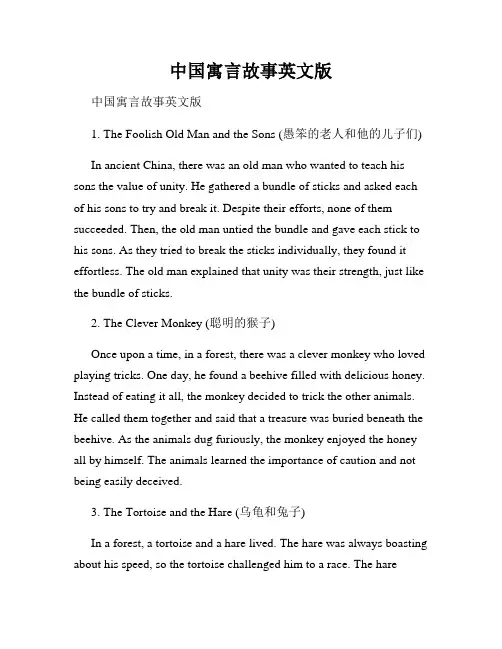
中国寓言故事英文版中国寓言故事英文版1. The Foolish Old Man and the Sons (愚笨的老人和他的儿子们)In ancient China, there was an old man who wanted to teach his sons the value of unity. He gathered a bundle of sticks and asked each of his sons to try and break it. Despite their efforts, none of them succeeded. Then, the old man untied the bundle and gave each stick to his sons. As they tried to break the sticks individually, they found it effortless. The old man explained that unity was their strength, just like the bundle of sticks.2. The Clever Monkey (聪明的猴子)Once upon a time, in a forest, there was a clever monkey who loved playing tricks. One day, he found a beehive filled with delicious honey. Instead of eating it all, the monkey decided to trick the other animals. He called them together and said that a treasure was buried beneath the beehive. As the animals dug furiously, the monkey enjoyed the honey all by himself. The animals learned the importance of caution and not being easily deceived.3. The Tortoise and the Hare (乌龟和兔子)In a forest, a tortoise and a hare lived. The hare was always boasting about his speed, so the tortoise challenged him to a race. The harelaughed, thinking victory was certain. He took a nap during the race, assuming he would easily win. Meanwhile, the tortoise continued at a slow and steady pace. When the hare woke up, he found the tortoise had already crossed the finish line. The tortoise taught the hare that perseverance and consistency are essential to success.4. The Greedy Farmer (贪婪的农夫)Once, there was a farmer who had a magic goose that laid golden eggs. The farmer became greedy and wanted to get all the golden eggs quickly. He thought there must be a lot of gold inside the goose. So he killed the goose, only to find that it was just like any other ordinary goose. The farmer lost the goose that laid the golden eggs, teaching him the lesson that greed leads to loss.5. The Fox and the Grapes (狐狸和葡萄)A hungry fox spotted a ripe bunch of grapes hanging from a vine. The fox tried to reach them but couldn't. He kept trying until tired. Finally, he gave up and said, "Those grapes must be sour and not worth eating." The fox made himself believe that the grapes were undesirable rather than admitting his failure. The moral of the story is that it is easy to despise what we cannot have.6. The Ant and the Grasshopper (蚂蚁和蝗虫)In a field, an ant worked hard to collect food for the winter. Meanwhile, a grasshopper played all day long. When winter arrived,the ant had enough food to survive, while the grasshopper had none. The ant learned the importance of hard work and planning for the future, while the grasshopper learned the consequences of laziness.7. The Fisherman and the Golden Fish (渔夫和金鱼)A fisherman caught a golden fish that turned out to be a magical creature. The fish pleaded to be released in return for granting any wish. The fisherman made extravagant wishes but was never satisfied. Finally, he realized his greed and asked the fish to return him to his humble life as a fisherman. The story teaches that contentment brings true happiness.8. The Dove and the Ant (鸽子和蚂蚁)A dove, flying over a river, noticed an ant struggling in the water. The dove plucked a leaf and dropped it next to the ant, saving its life. Later, the ant returned the favor by biting a hunter who was about to shoot the dove. The story highlights the importance of kindness and the idea that helping others will ultimately benefit oneself.9. The Boy Who Cried Wolf (撒谎的男孩)A mischievous boy lived in a village and often lied about a wolf threatening the flock. The villagers rushed to help him every time, only to discover he had tricked them. Eventually, when a real wolf appeared, the boy cried for help, but no one believed him. The moral is that repeated dishonesty will lead to a loss of trust and credibility.10. The Lion and the Mouse (狮子和老鼠)A mighty lion was caught in a hunter's net. A little mouse, moved by his cries, helped the lion by nibbling through the ropes to set him free. Later, when the lion fell into a trapper's trap, the mouse returned the favor and gnawed through the ropes. The story teaches that even the smallest of creatures can be of great help.These Chinese fables showcase important morals and life lessons that have been passed down through generations.。
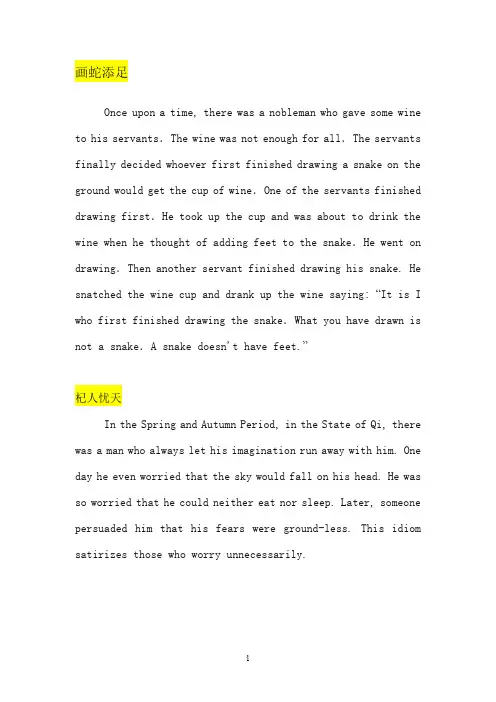
画蛇添足Once upon a time, there was a nobleman who gave some wine to his servants.The wine was not enough for all.The servants finally decided whoever first finished drawing a snake on the ground would get the cup of wine.One of the servants finished drawing first.He took up the cup and was about to drink the wine when he thought of adding feet to the snake.He went on drawing.Then another servant finished drawing his snake. He snatched the wine cup and drank up the wine saying: “It is I who first finished drawing the snake.What you have drawn is not a snake.A snake doesn't have feet.”杞人忧天In the Spring and Autumn Period, in the State of Qi, there was a man who always let his imagination run away with him. One day he even worried that the sky would fall on his head. He was so worried that he could neither eat nor sleep. Later, someone persuaded him that his fears were ground-less. This idiom satirizes those who worry unnecessarily.东施效颦In the Spring and Autumn Period (春秋时期,770-476 BC), there was a beauty in the State of Yue called Xishi. She often suffered from pains in her chest, and so she would often walk around doubled over and with her brows knitted. There was an ugly girl in the village called Dongshi who envied Xishi. Striving to emulate Xishi, she imitated her stoop, knitting her brows at the same time. She thought that this made her elegant, but in fact, it only made her more ugly. Later, this idiom came to be used to indicate improper imitation that produces the reverse effect.草木皆兵In AD 383, the king of Former Qin (秦朝), Fu Jian (fújiān 苻坚), led a huge army to attack Eastern Jin. After losing the first round of fighting, Fu Jian looked down from a city wall, and was terrified when he saw the formidable battle array of the Eastern Jin army. And then looking at the mountains around, he mistook the grass and trees for enemy soldiers. As a result,when the nervous Fu Jian led his army into battle, it suffered a crushing defeat. This idiom describes how one can defeat oneself by imaging difficulties.塞翁失马Near China's northern borders lived a man well versed in the practices of Taoism. His horse, for no reason at all, got into the territory of the northern tribes. Everyone commiserated with him."Perhaps this will soon turn out to be a blessing," said his father.After a few months, his animal came back, leading a fine horse from the north. Everyone congratulated him."Perhaps this will soon turn out to be a cause of misfortune," said his father.Since he was well-off and kept good horses, his son became fond of riding and eventually broke his thigh bone falling from a horse. Everyone commiserated with him."Perhaps this will soon turn out to be a blessing," said his father.One year later, the northern tribes started a big invasion of the border regions. All able-bodied young men took up arms and fought against the invaders, and as a result, around the border nine out of ten men died. This man's son did not join in the fighting because he was crippled and so both the boy and his father survived.欢迎您的下载,资料仅供参考!致力为企业和个人提供合同协议,策划案计划书,学习资料等等打造全网一站式需求。
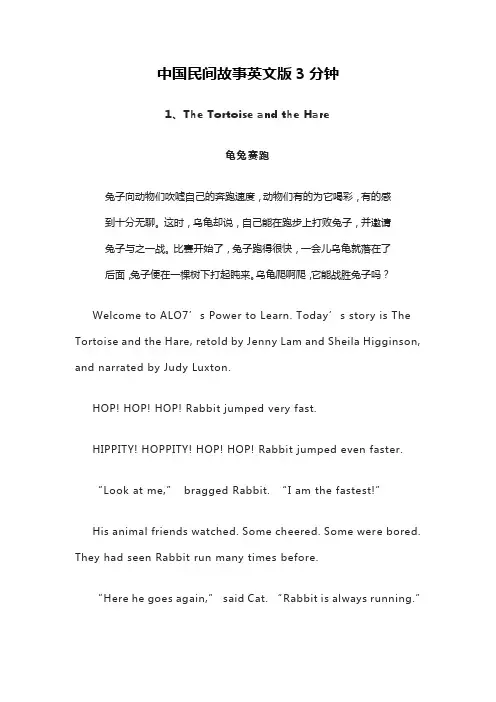
中国民间故事英文版3分钟1、The Tortoise and the Hare龟兔赛跑兔子向动物们吹嘘自己的奔跑速度,动物们有的为它喝彩,有的感到十分无聊。
这时,乌龟却说,自己能在跑步上打败兔子,并邀请兔子与之一战。
比赛开始了,兔子跑得很快,一会儿乌龟就落在了后面,兔子便在一棵树下打起盹来。
乌龟爬啊爬,它能战胜兔子吗?Welcome to ALO7’s Power to Learn. Today’s story is The Tortoise and the Hare, retold by Jenny Lam and Sheila Higginson, and narrated by Judy Luxton.HOP! HOP! HOP! Rabbit jumped very fast.HIPPITY! HOPPITY! HOP! HOP! Rabbit jumped even faster.“Look at me,”bragged Rabbit. “I am the fastest!”His animal friends watched. Some cheered. Some were bored. They had seen Rabbit run many times before.“Here he goes again,”said Cat. “Rabbit is always running.”“And he is always bragging about being the fastest runner,”said Owl.“He does run fast,”said Monkey.Tortoise walked up slowly to the other animals.Tortoise spoke slowly. “Is Rabbit bragging about being the fastest runner again?”he asked.The animals nodded their heads yes.“I will challenge Rabbit to a race. I can beat him,”said Tortoise calmly.All the animals got excited. “A race!”they cried.Rabbit laughed. “All right. Let’s race. I will win anyway.”Tortoise and Rabbit went to the starting line.“On your mark. Get set. Go!”cried Owl. He flapped his wings! Rabbit and Tortoise crossed the starting line. The race began!Rabbit ran fast. He hopped, and he ran. He hopped again. He ran even faster.Rabbit was far ahead of Tortoise. He kept running. He kept hopping.He stopped by a tree. He looked behind him. Where was Tortoise?Tortoise walked slowly. He was far behind.Rabbit yelled, “Hey, how do you expect to beat me? You are walking so slowly! You will never beat me. You will never win!”Rabbit sat down under the tree.“I will take a rest,”said Rabbit. “Tortoise is slow. He will never catch up. I have plenty of time to relax.”Rabbit rested under the tree. He got comfortable. Then he stretched out.Soon he was lying flat on the ground. He fell asleep. He snored loudly.Tortoise walked slowly. He kept walking. And walking. And walking.He walked to the tree where Rabbit was sleeping. He did not stop. He kept walking and walking and walking.Tortoise never stopped. He didn’t take a rest. He just walked.He kept walking until he got to the finish line.All the animals cheered. They were amazed that Tortoise won. He never gave up. He just kept walking and walking and walking.The cheering was very loud. It woke Rabbit. He jumped up from his sleep!“What happened? What’s that noise?”asked Rabbit. He began to run.He ran faster and faster and faster. But he was too late. Tortoise had already crossed the finish line. Tortoise won the race.以下翻译来自百度翻译:欢迎使用ALO7的学习能力。
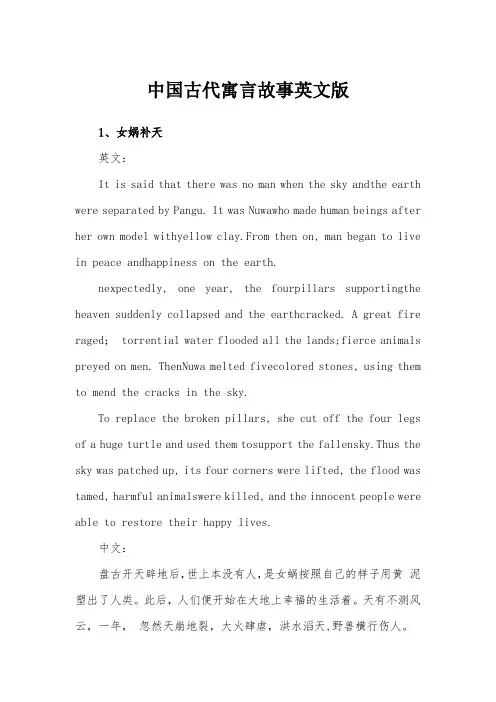
中国古代寓言故事英文版1、女娲补天英文:It is said that there was no man when the sky andthe earth were separated by Pangu. It was Nuwawho made human beings after her own model withyellow clay.From then on, man began to live in peace andhappiness on the earth.nexpectedly, one year, the fourpillars supportingthe heaven suddenly collapsed and the earthcracked. A great fire raged; torrential water flooded all the lands;fierce animals preyed on men. ThenNuwa melted fivecolored stones, using them to mend the cracks in the sky.To replace the broken pillars, she cut off the four legs of a huge turtle and used them tosupport the fallensky.Thus the sky was patched up, its four corners were lifted, the flood was tamed, harmful animalswere killed, and the innocent people were able to restore their happy lives.中文:盘古开天辟地后,世上本没有人,是女蜗按照自己的样子用黄泥塑出了人类。
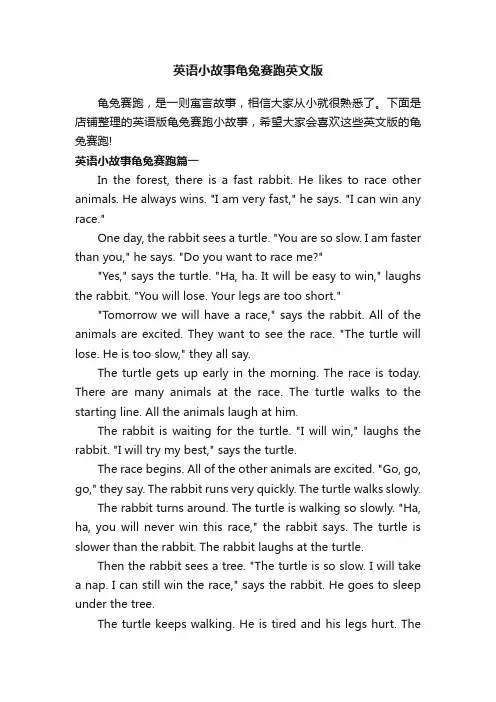
英语小故事龟兔赛跑英文版龟兔赛跑,是一则寓言故事,相信大家从小就很熟悉了。
下面是店铺整理的英语版龟兔赛跑小故事,希望大家会喜欢这些英文版的龟兔赛跑!英语小故事龟兔赛跑篇一In the forest, there is a fast rabbit. He likes to race other animals. He always wins. "I am very fast," he says. "I can win any race."One day, the rabbit sees a turtle. "You are so slow. I am faster than you," he says. "Do you want to race me?""Yes," says the turtle. "Ha, ha. It will be easy to win," laughs the rabbit. "You will lose. Your legs are too short.""Tomorrow we will have a race," says the rabbit. All of the animals are excited. They want to see the race. "The turtle will lose. He is too slow," they all say.The turtle gets up early in the morning. The race is today. There are many animals at the race. The turtle walks to the starting line. All the animals laugh at him.The rabbit is waiting for the turtle. "I will win," laughs the rabbit. "I will try my best," says the turtle.The race begins. All of the other animals are excited. "Go, go, go," they say. The rabbit runs very quickly. The turtle walks slowly.The rabbit turns around. The turtle is walking so slowly. "Ha, ha, you will never win this race," the rabbit says. The turtle is slower than the rabbit. The rabbit laughs at the turtle.Then the rabbit sees a tree. "The turtle is so slow. I will take a nap. I can still win the race," says the rabbit. He goes to sleep under the tree.The turtle keeps walking. He is tired and his legs hurt. Therabbit is sleeping under a tree. The turtle quietly walks past the rabbit. He is very quiet because he doesn't want to wake up the rabbit. "I can do it! I can do it!" says the turtle. "My legs are short and I am slow, but I can win this race." The turtle can see the finish line.Suddenly, the rabbit wakes up. The turtle is far away. "He will win!" he says. The rabbit runs, but it is too late. The turtle wins the race."I am slow. I have short legs. I am not fast, but I did it!" says the turtle. The rabbit is quiet. He slowly walks home.乌龟与兔为他们俩谁跑得快而争论不休。
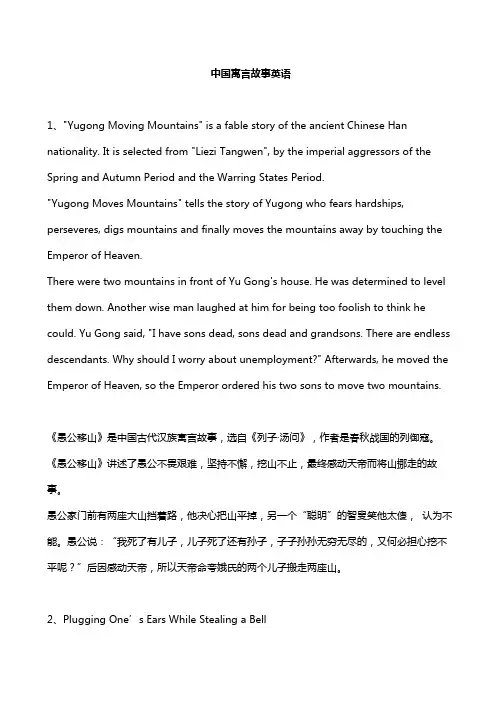
中国寓言故事英语1、"Yugong Moving Mountains" is a fable story of the ancient Chinese Han nationality. It is selected from "Liezi Tangwen", by the imperial aggressors of the Spring and Autumn Period and the Warring States Period."Yugong Moves Mountains" tells the story of Yugong who fears hardships, perseveres, digs mountains and finally moves the mountains away by touching the Emperor of Heaven.There were two mountains in front of Yu Gong's house. He was determined to level them down. Another wise man laughed at him for being too foolish to think he could. Yu Gong said, "I have sons dead, sons dead and grandsons. There are endless descendants. Why should I worry about unemployment?" Afterwards, he moved the Emperor of Heaven, so the Emperor ordered his two sons to move two mountains.《愚公移山》是中国古代汉族寓言故事,选自《列子·汤问》,作者是春秋战国的列御寇。
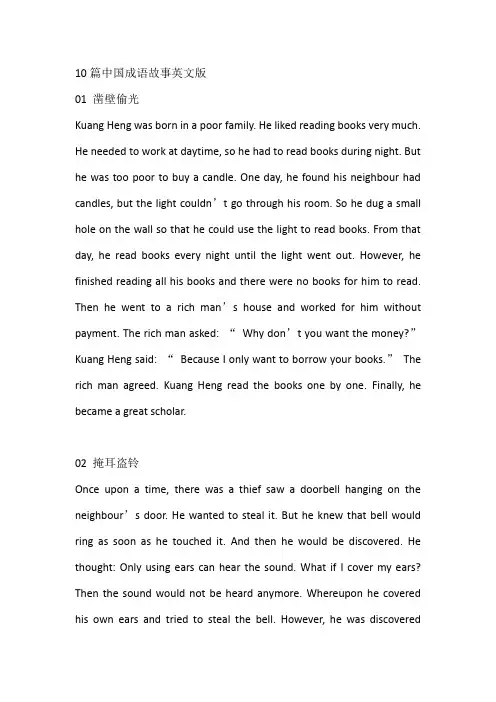
10篇中国成语故事英文版01 凿壁偷光Kuang Heng was born in a poor family. He liked reading books very much. He needed to work at daytime, so he had to read books during night. But he was too poor to buy a candle. One day, he found his neighbour had candles, but the light couldn’t go through his room. So he dug a small hole on the wall so that he could use the light to read books. From that day, he read books every night until the light went out. However, he finished reading all his books and there were no books for him to read. Then he went to a rich man’s house and worked for him without payment. The rich man asked: “Why don’t you want the money?”Kuang Heng said: “Because I only want to borrow your books.”The rich man agreed. Kuang Heng read the books one by one. Finally, he became a great scholar.02 掩耳盗铃Once upon a time, there was a thief saw a doorbell hanging on the neighbour’s door. He wanted to steal it. But he knew that bell would ring as soon as he touched it. And then he would be discovered. He thought: Only using ears can hear the sound. What if I cover my ears? Then the sound would not be heard anymore. Whereupon he covered his own ears and tried to steal the bell. However, he was discoveredimmediately when he touched the bell.03 邯郸学步During the Warring States period, a young man lived in Shouling. He always felt that he was not so perfect as he thought. One day, he heard that people in Handan walked in a gracefully way, so he decided to learn to walk there.One morning, he set off for Handan without telling anyone. Upon arrival at Handan, he was surprised when he saw the situation. Everyone walked in a different but gracefully way, children walking actively, the old walking steady and women walking charmingly. So he made up his mind to learn how the people of the State of Zhao walked in Handan. No matter how hard he tried, he was unable to learn the gait of the people there. On the contrary, he even forgot completely how he walked in Shouling. In the end, he had no choice but to crawl back to his hometown.04 囫囵吞枣Long ago, there was a young man who bought many fruits, like pears and dates. He sat at the roadside to eat them. An old man saw him and said: “Eating too many pears is good for teeth, but bad for your body.”The man asked: “How about dates?”The old man answered: “The dates are good for body but bad for teeth.”The young man thought for awhile and said: “I've got a good idea! I can eat pears with teeth and don't swallow them. And I can swallow dates without chewing.”Then he put a date into his mouth and swallowed it immediately. Unluckily, he was choked by the date.05 杞人忧天In the State of Qi, there was a man who was haunted by the fear that the sky might fall. He was so worried that he could neither eat nor sleep well. His friend said to him: “The sky is gathered by gas. We are living in the air. It is impossible to fall.”After hearing this, the man set his fear at ease instantly. His friend was also delightful.06 同舟共济In the Spring and Autumn period, the State of Wu and the State of Yue didn’t get along well. They had been fighting against each other for years.People in each country also didn’t have a good relationship. One day, the people of Wu and the people of Yue happened to be on the same boat to cross a river. At the beginning, they didn’t say a word with each other. When the boat sailed to the center of the river, a strong wind came. In no time, huge waves hit people’s faces. It seemed that the boat would sink at any time. Just then, they forgot all the hatred between two countries and began to help each other just like they were family. In theend, they safely got to the river bank under everyone’s effort.07 班门弄斧During the Warring States period, there wasa carpenter named Lu Ban. He was good at making woody tools. One day, a youngman passed by a red gate. He held up an axe with his hand and said: “This axeis really good. I can make the greatest tools in the world with it.”Hearing this, people around here all laughed. One person asked: “So, can you make amore beautiful gate than this one?”“That’s so easy! I was a student of Lu Ban before! Making a similar gate is like a piece of cake!”The young man said arrogantly. “But the gate was made by Lu Ban!”All people said.08 杯水车薪One evening, Zhao Da passed by a tea house when he came back from cutting firewood.There were a lot of people drinking tea there. He put the firewood outside and walked into the tea house. When he finished a cup of tea, he found his firewood on fire. Zhao Da shouted: “Oh no! It’s on fire!”He took a cup of water, ran out of the door and splashed the water on the fire. Other people in the tea house also took their own cups to fight the fire. However, instead of being put out, the fire burned even harder.09 自相矛盾A young man ran a business in the market. One day, he held up a shieldand said proudly: “My shield is very strong. It can stop any spear in the world.”Then he held up his spear and bragged: “My spear is very sharp. No matter how strong a shield is, my spear can pierce it.”People all around here laughed when they heard the words of the young man. One of them asked: “So, according to what you said, your spear is the sharpest. No matter how strong a shield is, your spear can pierce it. And your shield is also the strongest. No matter how sharp a spear is, it can’t pierce your shield. Well, what will happen if I pierce your shield with your spear?" The young man was too embarrassed to say anything.10 按图索骥In the Spring and Autumn Period, a man named Bo Le is an expert in identifying a good horse. He put his experiences in this area into his book Physiognomy Of Horses, which illustrated all kinds of horses with rich pictures and words. His son wanted to learn his skill about identifying a good horse. Then he read the book carefully over and over again. He thought he had mastered the skill. Once he saw a toad along the road, whose forehead was in accord with the features of a good horse. Then he rushed to his father and told him he had found a good steed. Hearing this, Bo Le didn’t know whether to cry or laugh. He had to reply jokingly: “This horse does too well in jumping, so it’s hard for us to rein it. ”。
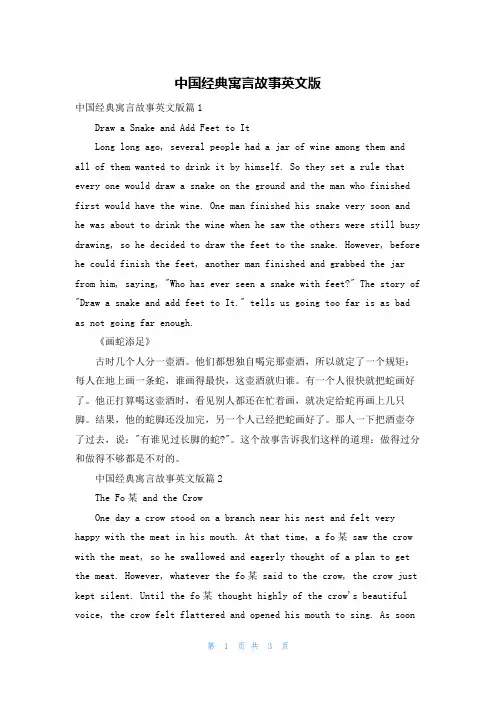
中国经典寓言故事英文版中国经典寓言故事英文版篇1Draw a Snake and Add Feet to ItLong long ago, several people had a jar of wine among them andall of them wanted to drink it by himself. So they set a rule that every one would draw a snake on the ground and the man who finished first would have the wine. One man finished his snake very soon and he was about to drink the wine when he saw the others were still busy drawing, so he decided to draw the feet to the snake. However, before he could finish the feet, another man finished and grabbed the jar from him, saying, "Who has ever seen a snake with feet?" The story of "Draw a snake and add feet to It." tells us going too far is as bad as not going far enough.《画蛇添足》古时几个人分一壶酒。
他们都想独自喝完那壶酒,所以就定了一个规矩:每人在地上画一条蛇,谁画得最快,这壶酒就归谁。
有一个人很快就把蛇画好了。
他正打算喝这壶酒时,看见别人都还在忙着画,就决定给蛇再画上几只脚。
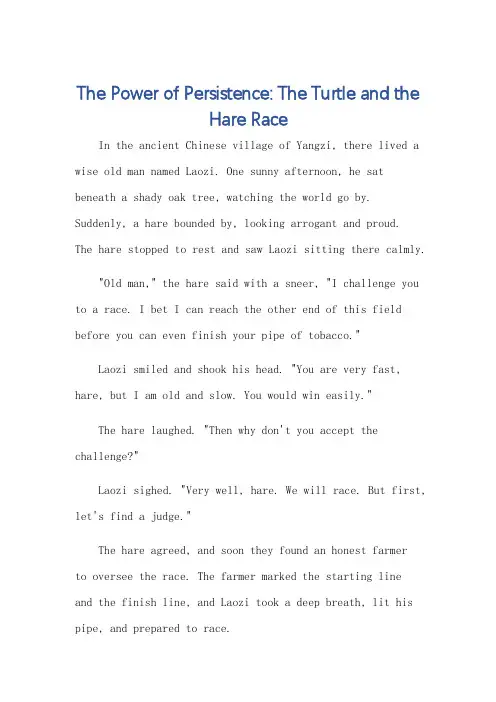
The Power of Persistence: The Turtle and theHare RaceIn the ancient Chinese village of Yangzi, there lived a wise old man named Laozi. One sunny afternoon, he sat beneath a shady oak tree, watching the world go by. Suddenly, a hare bounded by, looking arrogant and proud.The hare stopped to rest and saw Laozi sitting there calmly. "Old man," the hare said with a sneer, "I challenge you to a race. I bet I can reach the other end of this field before you can even finish your pipe of tobacco."Laozi smiled and shook his head. "You are very fast, hare, but I am old and slow. You would win easily."The hare laughed. "Then why don't you accept the challenge?"Laozi sighed. "Very well, hare. We will race. But first, let's find a judge."The hare agreed, and soon they found an honest farmerto oversee the race. The farmer marked the starting lineand the finish line, and Laozi took a deep breath, lit his pipe, and prepared to race.The hare, eager to win, bounded off at a great speed, leaving Laozi far behind. But as the hare ran, he saw a carrot patch and couldn't resist the temptation. He stopped to nibble on a juicy carrot, thinking, "I'll just rest for a moment. Laozi is so slow, he'll never catch up."Meanwhile, Laozi puffed on his pipe, taking his time, step by step, moving forward. He didn't rush, he didn't panic. He simply walked steadily, enjoying the scenery and the journey.Hours passed, and finally, the hare finished his carrot and realized he had wasted too much time. He quickly resumed his race, only to find Laozi calmly waiting for him at the finish line, pipe still in hand.The farmer declared Laozi the winner, and the hare, ashamed and defeated, slunk away. Laozi turned to the farmer and said, "You see, farmer, it is not always the fastest who wins. Sometimes, it is the one who is patient and persistent."And so, the lesson of the Turtle and the Hare race was taught, reminding us that speed is not always the key tosuccess. Persistence and patience, combined with a steady pace, can often lead to greater achievements.**坚持的力量:龟兔赛跑**在古老的杨子村,住着一个名叫老子的智者。
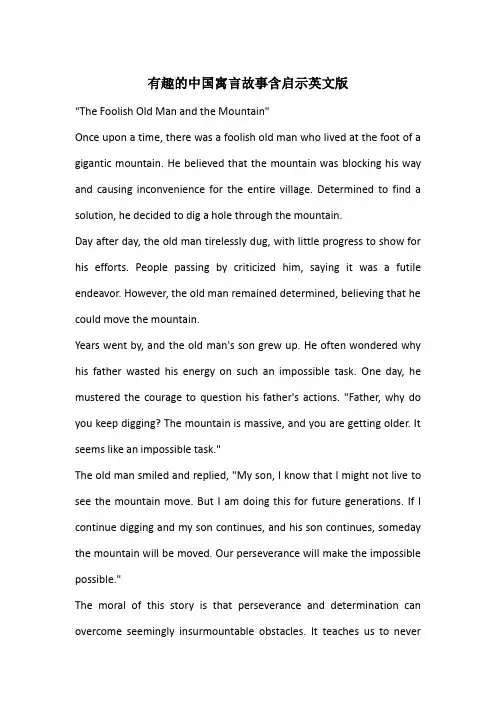
有趣的中国寓言故事含启示英文版"The Foolish Old Man and the Mountain"Once upon a time, there was a foolish old man who lived at the foot of a gigantic mountain. He believed that the mountain was blocking his way and causing inconvenience for the entire village. Determined to find a solution, he decided to dig a hole through the mountain.Day after day, the old man tirelessly dug, with little progress to show for his efforts. People passing by criticized him, saying it was a futile endeavor. However, the old man remained determined, believing that he could move the mountain.Years went by, and the old man's son grew up. He often wondered why his father wasted his energy on such an impossible task. One day, he mustered the courage to question his father's actions. "Father, why do you keep digging? The mountain is massive, and you are getting older. It seems like an impossible task."The old man smiled and replied, "My son, I know that I might not live to see the mountain move. But I am doing this for future generations. If I continue digging and my son continues, and his son continues, someday the mountain will be moved. Our perseverance will make the impossible possible."The moral of this story is that perseverance and determination can overcome seemingly insurmountable obstacles. It teaches us to nevergive up and to believe in the power of consistent effort.中文翻译:《愚公移山》从前,有个愚蠢的老人住在一座巨大山脚下。
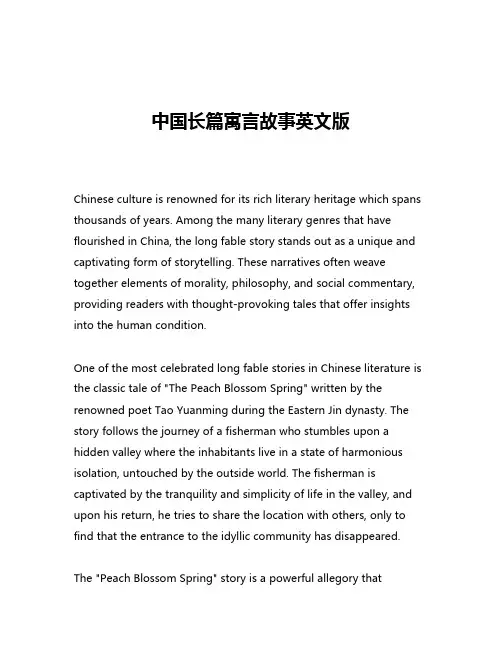
中国长篇寓言故事英文版Chinese culture is renowned for its rich literary heritage which spans thousands of years. Among the many literary genres that have flourished in China, the long fable story stands out as a unique and captivating form of storytelling. These narratives often weave together elements of morality, philosophy, and social commentary, providing readers with thought-provoking tales that offer insights into the human condition.One of the most celebrated long fable stories in Chinese literature is the classic tale of "The Peach Blossom Spring" written by the renowned poet Tao Yuanming during the Eastern Jin dynasty. The story follows the journey of a fisherman who stumbles upon a hidden valley where the inhabitants live in a state of harmonious isolation, untouched by the outside world. The fisherman is captivated by the tranquility and simplicity of life in the valley, and upon his return, he tries to share the location with others, only to find that the entrance to the idyllic community has disappeared.The "Peach Blossom Spring" story is a powerful allegory thatexplores the human desire for a utopian existence, free from the complexities and conflicts of the outside world. The story's enduring popularity is a testament to its timeless themes and the author's masterful storytelling. Through the fisherman's experience, readers are encouraged to reflect on the value of finding inner peace and the challenges of maintaining such a state in the face of the ever-changing realities of the external world.Another renowned long fable story in Chinese literature is "The Journey to the West" by the 16th-century novelist Wu Cheng'en. This epic tale follows the pilgrimage of the Buddhist monk Xuanzang and his three supernatural protectors – the monkey king Sun Wukong, the pig demon Zhu Bajie, and the river monster Sha Wujing – as they embark on a dangerous journey to India to obtain sacred Buddhist scriptures.The "Journey to the West" is a multilayered narrative that combines elements of adventure, fantasy, and philosophical exploration. The story's central themes revolve around the pursuit of enlightenment, the struggle between good and evil, and the importance of self-discipline and moral fortitude. Through the diverse cast of characters, readers are exposed to a rich tapestry of Chinese mythology and folklore, as well as the profound teachings of Buddhism.One of the most captivating aspects of "The Journey to the West" isthe character of Sun Wukong, the mischievous and powerful monkey king who serves as the story's protagonist. Sun Wukong's journey of self-discovery and ultimate redemption has resonated with generations of readers, making him one of the most iconic figures in Chinese literature.The long fable stories of China have also been influential in shaping the country's cultural identity and values. These narratives often reflect the philosophical and ethical principles that have been central to Chinese thought, such as Confucianism, Taoism, and Buddhism. Through the exploration of themes like filial piety, harmony with nature, and the pursuit of enlightenment, the long fable stories have played a crucial role in transmitting these core beliefs and values to successive generations.Moreover, the long fable stories of China have had a profound impact on the literary traditions of other Asian cultures. For instance, the "Journey to the West" has inspired numerous adaptations and reinterpretations in countries like Japan, Korea, and Southeast Asia, demonstrating the universal appeal and enduring influence of these timeless tales.In recent years, there has been a growing interest in the translation and dissemination of Chinese long fable stories to international audiences. As the world becomes increasingly interconnected, theopportunity to share these rich and captivating narratives with a global readership has never been greater. Through the translation of these works, readers from diverse cultural backgrounds can gain a deeper understanding of the unique perspectives and wisdom that the Chinese literary tradition has to offer.In conclusion, the long fable stories of China are a testament to the enduring power of storytelling and the ability of literature to transcend cultural boundaries. These narratives, with their intricate plots, memorable characters, and profound themes, continue to captivate and inspire readers around the world. As we delve into the enchanting world of Chinese long fable stories, we are reminded of the universal human experiences that unite us all, and the transformative potential of literature to broaden our horizons and deepen our understanding of the world.。
中国寓言故事英文中国古代,仍颇受很多人的喜爱。
讲中国寓言故事翻译成英文是怎样?下面就是小编给大家整理的中国寓言故事英文,希望大家喜欢。
中国寓言故事英文篇1:鼯鼠五会In the fields, there was a small animal called "wu shu" (the flying squirrel).It would say to everyone it met: "I have five skills: flying, walking, swimming, climbing trees, and digging holes in the ground."Thereupon, its pals would laugh at it, saying: "Though you have learned these skills, you have mastered none of them.""You can fly, but not high; you can swim, but not far; you can climb trees, but not to the treetop; you can dig holes in the ground, but not deep enough."When the flying squirrel heard what its pals said, it ran away manger.Indeed, the flying squirrel had learned five skills, but when put to use, they were useless. How could they be called real skills?田野里有一种小动物,名叫“鼯鼠”。
英译中国文化寓言故事寓言是一个怪物,当它朝你走过来的时候,分明是一个故事,生动活泼,而当它转身要离开的时候,却突然变成了一个哲理,严肃认真,下面这些是小编为大家推荐的几篇英译中国文化寓言故事。
英译中国文化寓言故事1:青蛙和牛An ox, grazing in a swampy1(沼泽的) meadow, chanced to set his foot among a parcel of young frogs, and crushed nearly the whole brood to death.One that escaped ran off to his mother with the dreadful news. "Oh, mother!" said he ,"It was a beast - such a big four footed beast! That did it." "Big?"quoth the old frog, "How big? Was it as big" -- and she puffed herself out to a great degree- "as big as this?" "Oh!" said the little one, "a great deal bigger than that.""well, was it so big?" and she swelled herself out yetmere. "Indeed, mother, but it was, and of you were to burst yourself you would never reach half its size." Provoked at such a disparagement of her powers, the old frog made one more trial, and burst herself indeed.So men are ruined by attempting greatness to which they have no claim.英译中国文化寓言故事2:贫富的真意One day a rich father took his young son on a trip to the country with the firm purpose to show him how poor people can be. They spent a day and night in the farm of a very poor family. When they got back from their trip the father asked his son, "how was the trip?""Very good, Dad!""Did you see how poor people can be?" the father asked."Yeah!" "And what did you learn?"The son answered, "I saw that we have a dog at home, and they have four. We have a pool that reaches to the middle of the garden; they have a creek(小溪) that has no end. We have imported lamps in the garden; they have the stars. Our patio(露台,天井) reaches to the front yard; they have a whole horizon."When the little boy was finishing, his father was speechless.His son added, "Thanks, dad, for showing me how poor we are!"Isn't it true that it all depends on the way you look at things? If you have love, friends, family, health, good humor and a positive attitude toward life, you've got everything!英译中国文化寓言故事3:牧童和狼A Shepherd-boy, who tended his flock not far from a village, used to amuse himself at times in crying out "Wolf! Wolf!" Twice or thrice his trick succeeded.The whole village came running out to his assistance when all the return they got was to be laughed at for their pains. At last one day the wolf came indeed.The boy cried out in earnest. But his neighbors, supposing him to be at his old sport, paid no heed to(不注意) his cries, and the wolf devoured(吞食,毁灭) the sheep.So the boy learned, when it was too late, that liars are not believed even when they tell the truth.。
中国经典英语寓言故事阅读中国经典英语寓言故事阅读(通用14篇)寓言故事是含有讽喻或明显教训意义的故事,是文学体裁的一种。
它的结构简短,多用借喻手法,使富有教训意义的主题或深刻的道理在简单的故事中体现。
以下是小编整理的中国经典英语寓言故事阅读,希望对大家有所帮助。
中国经典英语寓言故事阅读篇1King Hui of Liang watched the cook dissecting an ox. Up went his hand, down went the knife, cutting it just right with dexterous movements. The King praised:梁惠王看厄丁解牛,手起刀落,动作利索,恰到好处,连声夸奖说“Your skill is excellent!”“你的技术真是太好了!”The cook answered:厄丁答道:"1 can do it so dexterously because I am familiar with the physiological structure of the ox. I see perfectly well each and every part of the ox which is no longer a whole ox to me. I have a clear mental picture of where its joints and main and collateral channels are, and know exactly where to start cutting and how much force is needed."“我所以能干得这样利索,是因为熟悉牛的生理结构。
现在,我看到的牛已经不是一头全牛了:哪里是关节?哪里有经络?从哪里下刀?需要用多大的力气?我胸中有数,眼前清清楚楚。
成语寓言故事英文版中蕴含的审美倾向体现为:对世俗功利的超越、对自然无为的崇尚和对逍遥自由的向往,下面这些是小编为大家推荐的几篇寓言故事英文版。
成语寓言故事英文版1:曲高和寡Long, long ago, King Wei of the State of Chu trusted Song Yu very much, but he often heard others say bad things against Song Yu.One day, King Wei of Chu asked Song Yu: "Have you ever done anything unfitting to your position? Otherwise, why do officials and people say bad things against you?"Song Yu quickly kowtowed and said:"Yes, it may be so. I hope Your Majesty will forgive my wrongdoings and allow me to finish what I have to say."Then he continued: "I hear that there is a singer who often sings in the capital. In the beginning, he always sings the "Song of the Rustic Poor", and several thousand people sing with him. When he sings the song "Picking Vetches at Yangling", several hundred people sing with him; when he sings the song "Spring Snow", only over ten people sing with him. Finally, when he sings an even more refined song, only very few people in the whole state can sing with him. Therefore, the more refined the song he sings, the fewer people can join him."成语寓言故事英文版2:半斤八两In the past, the grandson of a prime minister was a notorious spendthrift.He squandered all the family property a nd couldn’t even afford his own meals, so he oftenborrowed rice from others.Once he borrowed another bag of rice.He carried it half- wayand couldn’t go any further, so herested by the roadside.At this moment, a poor man in rags happened to pass by. He called this poor man, set the payand let the poor man carry the rice for him.Unexpectedly, after carrying the rice for some distance, the poor man also panted and couldn’twalk any further.The grandson complained:“I am the grandson of a prime minister. It is natural that I can neither lift with my hands norcarry on my shoulder anything heavy.But you are from a poor family. Why are you also so useless?”Unwilling to give in, the poor man glared and retorted:“How can you blame me? I am not from a poor family. I am the grandson of a prime minister,too.”成语寓言故事英文版3:男女有别A man named Fu Xian was fond of reading books. Though proficient in literature andetiquette, he was stubbornly adherent to outworn rules.Being impractical and dull, he looked just like an old pedant.One day, Fu Xian strolled on the street with measured strides and asked whomever he met:“Have you seen Wei San?”Someone pointed to the direction and he walked on unhurriedly with measured strides. Whenhe saw Wei San, he panted for a while, then said:“I just saw your wife doing needlework under a tree. She was tired and taking a nap.Your child was playing beside a well, only 3 to 5 chi away from it.It seemed to me that someaccident might happen.As there is prudent reserve between men and women, it wasnot convenient for me toawaken your wife in person.That's why I have come all the way here to tell you.”Upon hearing this, Wei San was panic-stricken and hurried home. When he got home, his wifewas bending over the well, wailing bitterly for their son.。
著名的英文版中国寓言故事Staying by a Stump Waiting for More Hares To Come and Dash Themselves Against ItThis story took place more than 2,000 years ago. At that time there was a man who was famous for staying by a stump waiting for more hares to come and dash themselves against it.He was a yong farmer,and his family had been farmers for generations.Year after year and generation after generation, farmers used to sow in spring and harvest in autumn,beginning to work at sunrise and retiring at sunset.In good harvest years,they could only have enough food to eat and enough clothing to wear.If there was a famine due to crop failure,they had to go hungry.This young farmer wanted to improve his life.But he was too lazy and too cowardly.Being lazy and cowardly over everything,he often dreamed of having unexpected blessings.A miracle took place at last. One day in late autumn,when he was ploughing in the field,two groups of people were hunting nearby.As shoutings were rising one after another,scared hares were running desperately.Suddenly,a blind hare dashed itself headlong against the stump of a dead tree in his field and died.That day,he ate his fill.From that day on,he no longer went in for farming again.From morning till night,he stayed by that miraculous stump,waiting for miracles to take place again.守株待兔Staying by a Stump Waiting for More Hares To Come and Dash Themselves Against It相传有一个农民,日出而作,日入而息.遇到好年景,也不过刚刚吃饱穿暖;一遇灾荒,可就要忍饥挨饿了.他想改善生活,但他太懒,胆子又特小,干什么都是又懒又怕,总想碰到送上门来的意外之财。
寓言故事英文版及翻译寓言是我国文化宝库中一颗璀璨的明珠,它不仅具有悠久的历史,还蕴含着丰富内涵。
小编整理了英文版寓言故事及翻译,欢迎阅读!英文版寓言故事及翻译一分定不争A wild hare was running in the field and behind it more than a hundred people were chasing it.It was not because that the hare could be divided into a hundred portions but the ownership of the hare was not decided.When a lot of hares were piled in the market, the passers -- by would not even loot at them. It was not because that people did not want to get them, but those hares already had their owner, and the ownership had been decided. As far as the administration of a country is concerned, the key is to make laws and regulations, establish clear ownership.一只兔子在野地里跑,后面常有百多人追逐。
这并不是因为这只兔子可以分成一百份,每人可得一份,而是因为兔子的所有权没有确定。
当许多兔子堆积在市场上时,路过的行人之所以看也不看,也不是因为人们不愿意得到兔子,而是因为这种兔子已经有了主人,所有权已经确定。
仅就治理天下和国家而言,关键在于制定法令,确定名份。
英文版寓言故事及翻译二老子问疾Laozi once went to visit the sick sage Shang Rong, and consulted him with somephilosophical problems.Shang Rong told him that when he passed his hometown he should get off the chariot. Laozi asked, Is this meant to show that I have not forget about the people in the hometown?Shang Rong nodded and added that when he passed an old tall tree he should walk fast in small paces. Laozi said, Do you mean we should respect seniors?Shang Rong nodded again, and opened his mouth and asked, Is my tongue still there? Yes, Laizi repled. Is my tongue still there? No, Laozi answered, Do you know what this mean? Shang Rong said. Laozi answered, You are telling me that the teeth fell off early because of their hardness while the tongue lasts long because of its softness?Exactly! You already know all priciples and truths in the world.老子去探望病重的哲人商容,并请教有关的哲学问题。
画蛇添足
Once upon a time, there was a nobleman who gave some wine to his servants.The wine was not enough for all.The servants finally decided whoever first finished drawing a snake on the ground would get the cup of wine.One of the servants finished drawing first.He took up the cup and was about to drink the wine when he thought of adding feet to the snake.He went on drawing.Then another servant finished drawing his snake. He snatched the wine cup and drank up the wine saying: “It is I who first finished drawing the snake.What you have drawn is not a snake.A snake doesn't have feet.”
杞人忧天
In the Spring and Autumn Period, in the State of Qi, there was a man who always let his imagination run away with him. One day he even worried that the sky would fall on his head. He was so worried that he could neither eat nor sleep. Later, someone persuaded him that his fears were ground-less. This idiom satirizes those who worry unnecessarily.
东施效颦
In the Spring and Autumn Period (春秋时期,770-476 BC), there was a beauty in the State of Yue called Xishi. She often suffered from pains in her chest, and so she would often walk around doubled over and with her brows knitted. There was an ugly girl in the village called Dongshi who envied Xishi. Striving to emulate Xishi, she imitated her stoop, knitting her brows at the same time. She thought that this made her elegant, but in fact, it only made her more ugly. Later, this idiom came to be used to indicate improper imitation that produces the reverse effect.
草木皆兵
In AD 383, the king of Former Qin (秦朝), Fu Jian (fú jiān 苻坚), led a huge army to attack Eastern Jin. After losing the first round of fighting, Fu Jian looked down from a city wall, and was terrified when he saw the formidable battle array of the Eastern Jin army. And then looking at the mountains around, he mistook the grass and trees for enemy soldiers. As a result, when the nervous Fu Jian led his army into battle, it suffered a crushing defeat. This idiom describes how one can defeat oneself by imaging difficulties.
塞翁失马
Near China's northern borders lived a man well versed in the practices of Taoism. His horse, for no reason at all, got into the territory of the northern tribes. Everyone commiserated with him.
"Perhaps this will soon turn out to be a blessing," said his father.
After a few months, his animal came back, leading a fine horse from the north. Everyone congratulated him.
"Perhaps this will soon turn out to be a cause of misfortune," said his father.
Since he was well-off and kept good horses, his son became fond of riding and eventually broke his thigh bone falling from a horse. Everyone commiserated with him.
"Perhaps this will soon turn out to be a blessing," said his father.
One year later, the northern tribes started a big invasion of the border regions. All able-bodied young men took up arms and fought against the invaders, and as a result, around the border nine out of ten men died. This man's son did not join in the fighting because he was crippled and so both the boy and his father survived.。